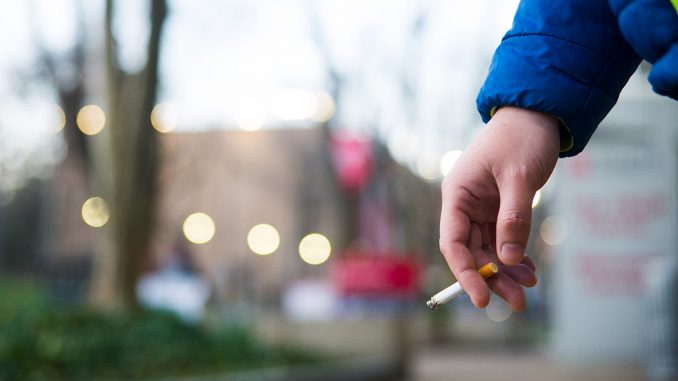
Temple University will become a tobacco-free campus, President Richard Englert announced on Tuesday.
The university, following recommendations from the Presidential Smoke-free Campus Task Force, will adopt a tobacco-free, clean air policy for all indoor, outdoor and adjacent sidewalks and walkways within all U.S. campus borders. This means the use of all tobacco products, including cigarettes, cigars, hookah, nicotine delivery devices, like Juul, and chewing tobacco will be banned on Temple’s Main, Ambler, Harrisburg and Center City campuses.
The target completion date for the tobacco-free policy is July 1, Englert wrote in an email to the Temple community, with full implementation set for the start of Fall 2019.
“We plan to attack the issue on a number of fronts, including smoking cessation to help students, faculty, and staff break their nicotine addiction,” Englert wrote.
The task force, which was created in Spring 2017 and led by College of Public Health Dean Laura Siminoff, submitted its final report to Englert in May 2018. It recommended several policies for the university to address health issues associated with tobacco use, including eliminating second-hand smoke and prohibiting the sale of tobacco and nicotine delivery devices on Temple’s campuses, including in privately-owned retail stores.
Siminoff could not immediately be reached for comment on Monday.
Juul purchases increased by 641 percent from 2.2 million nicotine delivery devices sold in 2016 to 16.2 million in 2017, according to a report by the American Medical Association.
Shannan Lowe, a sophomore biology major who does not smoke tobacco products, said banning them on campuses outright could be problematic for users, but tobacco use within campus borders should be limited.
“I do hate walking outside and inhaling smoke,” Lowe said. “They do have rules where you’re not allowed to smoke within 20 feet of an entrance [to a university building], but people still do it all the time.”
The university does have a policy in place that prohibits smoking within 25 feet of campus building entrances. However, in an observational study the task force conducted between October 2017 and March 2018, more than half of people seen smoking on campus between were less than 25 feet from building entrances. Specific problem areas included walkways between Tuttleman Learning Center and Speakman Hall and passageways around Anderson and Gladfelter halls.
As part of the tobacco-free campus implementation, the university will place no smoking signs around Temple’s campuses notifying the community about the policy and remove structures where smokers dispose of tobacco products. The task force will also provide contact information for the university and city’s services to help tobacco users quit.
The task force found in a survey with 8,095 respondents that 36.4 percent of students smoked. Out of 2,420 university employee respondents, 34.5 percent smoked on Main Campus, according to the report.
Jessica Sykes, a senior communication studies major, said banning tobacco products might not be effective on a college campus, especially one like Temple, which is open to the public.
“If it’s a public institution, you can’t make students not do something that is a personal choice, even if it’s unhealthy and it produces second-hand smoke,” Sykes said.
“You can’t ban a commercial product in a campus bubble because it is still a public space,” she added.
The task force will have “compassionate” enforcement of the new policy, according to the report, which also details that Temple Police will also handle enforcement, especially in specific “hot spots” where smoking is common, like outside of Anderson and Gladfelter halls and the TECH Center. If someone is using tobacco products on campus, they will be provided with information about available addiction services.
Smoking adds extra costs to the university’s efforts to combat litter and environmental pollution. Temple Facilities and Management staff estimate an expenditure of $17,250 for the initial purchase of 115 structures to dispose of tobacco products and $750 annually for replacing them.
Facilities and Management also estimates an additional $22,000 annually in staff time for cleaning cigarette butts from walkways and emptying receptacles, the report states.
The task force will work with Campus Safety Services to establish consequences for students, faculty and staff when they violate the new policy, according to the report.
“I hope more people are encouraged to quit or at least to take a second look on why they decide to smoke,” said Maria Dattilo, a senior communication studies major. “If smoking were to be banned on campus, it would encourage them not to smoke as much and it would probably save their lungs too.”


A college enacts a paternalistic policy instead of letting adults make their own decisions. Can’t let them do things we don’t like! The administration knows better than you do!
Here’s some other annoying things we should ban because some people find it annoying (just like smoking!): slow walkers, people that play music on speakers, talking on speaker phone in public, small talk in elevators, bell tower preacher, the jehovah’s witnesses, planned parenthood fundraiserers that try to talk to me, and any protest.
We should also consider banning all fattening food and drinks from campus since it’s bad for people’s health and leads to litter and trash. Only water and Salad Works on Temple’s campuses. People shouldn’t eat anything fattening, so ban it.